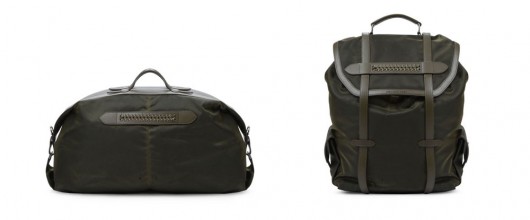COMMERCIALE VS. REALE
 Borsone e zaino Falabella in nylon eco-sostenibile, con rivestimento interno ottenuto da bottiglie di plastica riciclate.
Borsone e zaino Falabella in nylon eco-sostenibile, con rivestimento interno ottenuto da bottiglie di plastica riciclate.
Dalla collezione uomo ss17 Stella Mc Cartney
Si può obiettare che il risultato finale è buono, cioè la diffusione delle idee e il finale minor impatto sull’ambiente, ma il diritto di restare perplessi rimane, assieme ad un certo stupore fra il dire e il fare delle aziende.
Tuttavia si va avanti a piccoli passi, spesso sperimentali, spesso incerti sul sfondo finale della ricerca di un minore impatto sulla Terra. La Wolford sta mettendo a punto un tessuto ecologico che si dovrà dissolvere nell’ambiente in modo non solo da non danneggiare il verde ma di fondersi con lui. Calze e lingerie d’autore saranno prodotte con un polimero di fibra cellulosica “cradle to cradle”. Ci mangeremo i collant? Spero di no, ma se dovesse diventare utile, ne parleremo.
Riparliamo di Stella Mc Cartney, paladina del cruelty free, che ha dichiarato guerra alla plastica e lavora ad una nuova fibra tessile ricavata dai rifiuti marini. La borsa “Falabella Go”, presentata a Parigi di recente, è di questo nuovo materiale, utilizzato per produrre anche delle sneakers siglate adidas. Secondo la stilista “ ricavare abiti dalla spazzatura sarà un nuovo lusso”. Ci permettiamo di dubitarne, anche se lodiamo le intenzioni. Perché sempre di plastica si tratta, anche se riciclata. Forse sarebbe meglio trovare il modo di usare materiale naturale senza accanimenti e orrori. Forse. Luisa Ciuni
“The last waste will be
menthol flavoured”, as Lucio Battisti sang in his popular Canto Brasileiro. It was the 1973 and we couldn’t imagine that even the ethics of fashion would have been affected by the same strategy used for cheese triangles: the role of ecological marketing for selling clothes, socks and so on. Because there’s a difference between the moral elaboration in favor of the planet and the living beings, animals included, and the use of these concepts in a commercial sense. We can say that the final result, the spread of ideas and a minor impact on the environment, is good, but there’s still an amount of uncertainty, due to the difference between the “say” and the “do” of the companies. However, this research is moving forward, with very small steps, often experimental, often uncertain. Wolford is developping an ecological biodegradable fabric; signed stockings and lingerie will be made of a “cradle to cradle” cellulosic polymer. Are we going to eat stockings? I hope not, but if it’s going to be useful, let’s talk about it. And let’s talk about Stella Mc Cartney again: heroine of the cruelty-free, that declared war against plastic and is working on a new textile fibre obtained from the sea wastes. The bag “Falabella Go”, presented in Paris recently, is made by this new material, also used to make sneakers branded adidas. In the designer’s opinion, “making clothes from rubbish will be the new luxury”. We allow ourselves to be doubtful, even if we praise the intentions. Because we are still talking about plastic, even if recycled. Maybe it would be better to find a way of using natural materials without doggedness and horrors. Maybe. Luisa Ciuni





